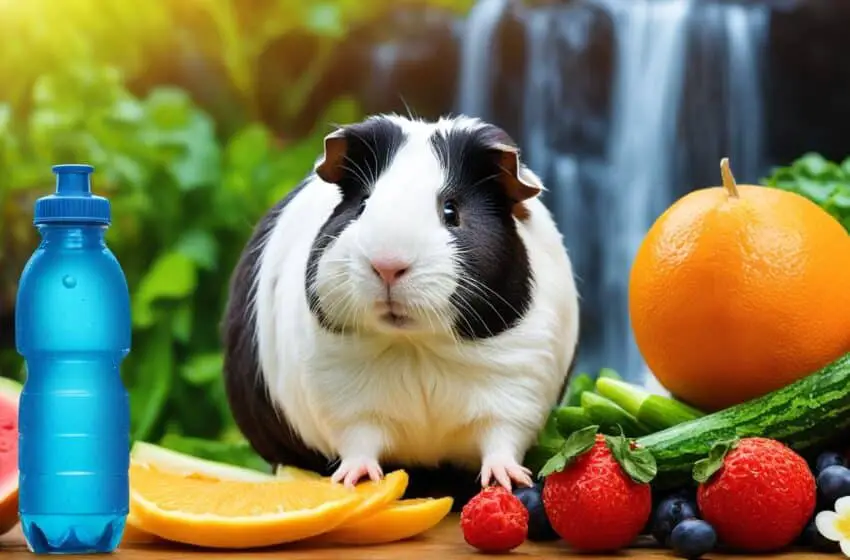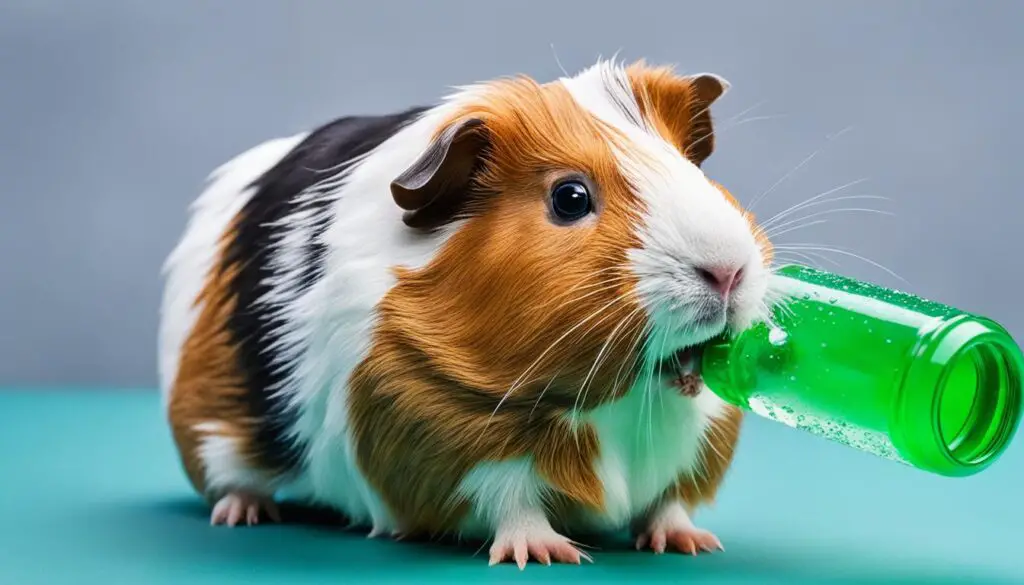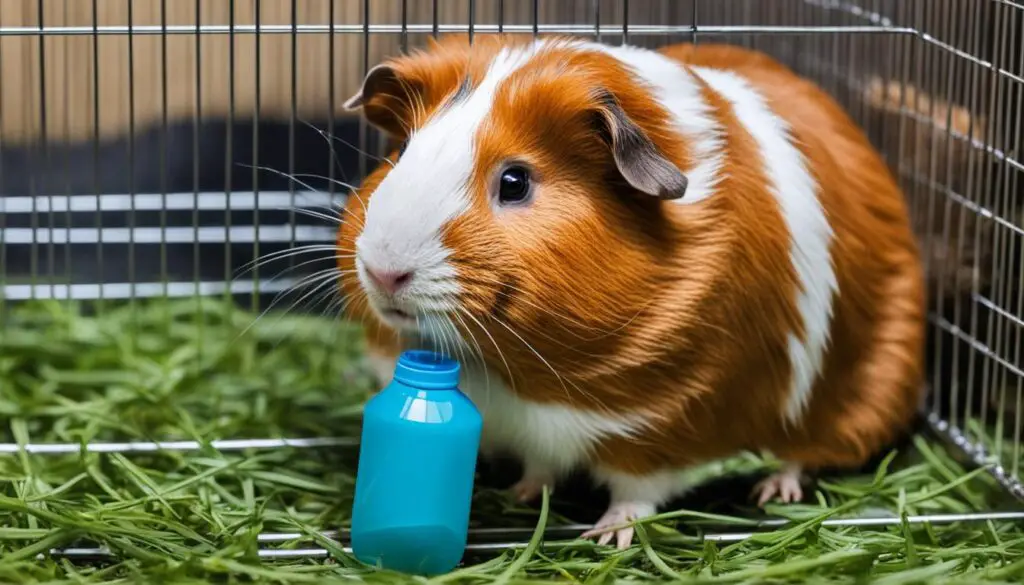Hydration Tips for Keeping Your Guinea Pig Healthy

Hello, fellow guinea pig enthusiasts! As a proud guinea pig owner myself, I understand the importance of providing our small furry friends with the best care possible. One crucial aspect of guinea pig care is ensuring proper hydration.
Guinea pigs, just like any other living creature, require adequate hydration to thrive and maintain their overall health. They rely on a sufficient water intake to support essential bodily functions, regulate body temperature, aid digestion, and promote organ health.
In this article, I will share with you some valuable hydration tips that will help you keep your guinea pig healthy and happy. These tips are based on factual data from reliable sources, ensuring that you are equipped with the best knowledge to provide optimal care for your furry friend.
So, whether you are a new guinea pig owner or have been caring for these adorable creatures for a while, read on to discover how you can ensure your guinea pig stays hydrated and thrives. Let’s dive into the world of guinea pig hydration and learn how to keep our beloved pets healthy and lively!
Key Takeaways:
- Proper hydration is crucial for guinea pigs’ well-being and overall health.
- Guinea pigs rely on adequate water intake to support bodily functions, regulate body temperature, aid digestion, and promote organ health.
- Stay tuned for essential hydration tips and techniques to ensure your guinea pig stays hydrated and happy.
- Detecting signs of dehydration and addressing them in a timely manner is crucial for your guinea pig’s well-being.
- By prioritizing hydration, you can provide the best care possible for your furry friend.
Why Hydration is Important for Guinea Pigs
Proper hydration is crucial for the health of guinea pigs. They rely on an adequate water intake to support various bodily functions, maintain their body temperature, promote digestion, and support organ health. Guinea pigs have a unique physiology that requires regular hydration to prevent health issues.
When guinea pigs don’t get enough water, they can become dehydrated, leading to serious health problems such as urinary tract issues and digestive disorders. Dehydration can also cause difficulty in passing stool and lead to constipation, which can further impact their overall well-being.
Ensuring that your guinea pig stays properly hydrated is essential for their optimal health and well-being. You should make it a priority to provide fresh and clean water at all times, especially during hot weather or if your guinea pig lives in a dry environment.
Remember, preventing dehydration is easier than treating it, so it’s crucial to monitor your guinea pig’s water intake regularly.
In the next section, we will delve into the importance of hydration for guinea pigs and explore specific strategies to ensure they stay hydrated and healthy.

Key Points:
- Proper hydration is crucial for guinea pigs to support bodily functions and maintain overall health.
- Inadequate water intake can lead to dehydration and serious health problems.
- Regularly providing fresh and clean water is essential for guinea pig owners.
- Preventing dehydration is easier than treating it, so monitoring water intake is important.
Tips for Ensuring Proper Hydration for Your Guinea Pig
Proper hydration plays a crucial role in keeping your guinea pig healthy and happy. To ensure that your furry friend stays hydrated, here are some practical tips and techniques:
1. Provide Fresh Water
Always make sure that your guinea pig has access to fresh, clean water. Change the water daily to prevent bacterial growth and keep it at room temperature. Water bottles with a sipper tube are ideal for guinea pigs, as they minimize the risk of contamination and spillage.
2. Offer Water-Rich Foods
In addition to water, you can keep your guinea pig hydrated by offering water-rich fruits and vegetables. Some examples include cucumber, bell peppers, watermelon, and leafy greens like lettuce and spinach. These foods not only provide hydration but also offer essential nutrients for your guinea pig’s overall health.
3. Monitor Water Intake
Keep an eye on your guinea pig’s water intake. A healthy guinea pig should consume about 80-100ml of water per kilogram of body weight each day. If you notice a significant decrease in water consumption, it could be a sign of dehydration or an underlying health issue. Consult a veterinarian if you have any concerns.
4. Avoid Excessive Heat
Guinea pigs are sensitive to heat and can easily become dehydrated in hot weather. Ensure that their living environment is well-ventilated and kept at a moderate temperature. Provide shade and avoid direct sunlight exposure to prevent overheating.

“Proper hydration is essential for the health and well-being of guinea pigs.”
By implementing these tips, you can ensure that your guinea pig remains properly hydrated. Remember that dehydration can lead to serious health issues, so it’s vital to prioritize their hydration needs. With fresh water, water-rich foods, and a watchful eye, you can contribute to your guinea pig’s overall well-being.
Signs of Dehydration in Guinea Pigs and How to Address Them
Detecting dehydration is essential for timely intervention. It is important to be aware of the signs that may indicate your guinea pig is dehydrated. By recognizing these symptoms early, you can take the necessary steps to address the issue and ensure your furry friend’s well-being.
Common Signs of Dehydration
- Loss of appetite: A decrease in food intake can be a sign of dehydration.
- Dry skin: If your guinea pig’s skin appears dry and lacks elasticity, it may indicate dehydration.
- Sunken eyes: Dehydration can cause the eyes to appear sunken or dull.
- Reduced activity levels: A lethargic or inactive guinea pig may be dehydrated.
If you notice any of these signs, it is important to address dehydration promptly to prevent further health complications.
Addressing Dehydration in Guinea Pigs
To address dehydration in your guinea pig, consider the following steps:
- Offer fresh water: Ensure that clean water is available to your guinea pig at all times. Guinea pigs should have access to fresh water in a water bottle or water bowl.
- Provide water-rich foods: Offer fruits and vegetables with high water content, such as cucumber, lettuce, and watermelon. These can help supplement the guinea pig’s hydration levels.
- Use electrolyte solutions: In cases of severe dehydration, you can provide electrolyte solutions designed for small animals. These solutions can help restore electrolyte balance and replenish fluids.
- Seek veterinary assistance: If your guinea pig shows persistent signs of dehydration or if you are unsure about how to address the issue, consult a veterinarian. They can provide professional guidance and medical treatment if necessary.
By monitoring your guinea pig for signs of dehydration and taking appropriate action, you can help ensure their hydration levels are maintained, promoting their overall health and well-being.
Conclusion
In conclusion, proper hydration is vital for the health and well-being of guinea pigs. By following the guinea pig hydration tips outlined in this article, you can ensure that your furry friend stays healthy, hydrated, and full of energy.
Remember to provide fresh water to your guinea pig at all times. Clean and refill their water bottle regularly to prevent contamination. Additionally, consider offering water-rich foods such as cucumber, watermelon, and lettuce to supplement their hydration needs.
It is crucial to monitor your guinea pig for any signs of dehydration, such as loss of appetite, dry skin, sunken eyes, and reduced activity levels. If you observe these symptoms, take immediate action to address the dehydration by offering them electrolyte solutions or seeking veterinary assistance.
By prioritizing hydration and implementing these guinea pig hydration tips, you can provide your beloved pet with the best possible care and ensure their long-term health and happiness. Keep your guinea pig hydrated, and they will thrive!
FAQ
Why is proper hydration important for guinea pigs?
Proper hydration is crucial for the health of guinea pigs as they rely on an adequate water intake to support various bodily functions, maintain their body temperature, promote digestion, and support organ health.
What measures can I take to ensure my guinea pig stays hydrated?
You can ensure your guinea pig stays hydrated by providing fresh water at all times, offering water-rich fruits and vegetables, and monitoring their water intake closely.
What are the signs of dehydration in guinea pigs?
Common signs of dehydration in guinea pigs include loss of appetite, dry skin, sunken eyes, reduced activity levels, and changes in urine color and frequency.
How can I address dehydration in my guinea pig?
If you suspect your guinea pig is dehydrated, you can offer electrolyte solutions specifically designed for small animals and consult a veterinarian for further guidance and treatment.



